22 features, two series, two pilots, three shorts, and a panel later, my virtual Sundance journey is complete! While missing the in-person buzz and theatrical experience of a conventional festival, this year’s biggest indie celebration made up for it in accessibility. More people got to participate in the conversation and it was easier to watch more of the slate. Even when festivals go back to being in-person, I hope they learn from the benefits and keep an online component.
This wasn’t just a film festival during the pandemic — it was defined by it. Much of the work selected engaged with solitude and isolation and the work that was more expansive inevitably felt like an escape. Much of my favorite work felt enhanced by the circumstances of watching alone on my laptop in my tiny room.
We covered eight especially queer things at Sundance, but I watched so much more. Some of the things we didn’t review are still a little gay and I’ll make sure to note when that’s the case. But I also want to share a thought or two about everything I watched. Film festivals shape conversation and I think it’s worthwhile for a queer trans person to add to that even with cis straight films. So without further ado here’s a full recap of everything I saw at Sundance.
These Days (pilot) (dir. Adam Brooks)
I started the festival with this appropriate choice — a pandemic-set pilot about a woman going on virtual dates. It is not gay — and I think Connecting… covered similar ground better — but William Jackson Harper plays a culture writer dating for content and I personally found that relatable.
CODA (dir. Sian Heder)
This was the big winner at Sundance this year and it’s easy to see why. It’s a well-made, uplifting story with just enough specificity and a phenomenal cast. I do think the movie is good — albeit a little predictable — but I also find it to be a frustrating reminder of where we’re at with deaf representation. The protagonist of this movie is the only hearing person in her family and the writer/director is hearing. The deaf cast of Marlee Matlin, Troy Kotsur, and Daniel Durant are all phenomenal and thankfully given full, well-realized characters to portray. But I wish we were at a place where a movie with a deaf protagonist was winning Sundance, where a movie with a deaf writer/director was winning Sundance. Instead we’re celebrating that the movie cast deaf actors as deaf characters — something that is unfortunately not always the case. Zeinabu irene Davis’ Compensation, a masterful film with deaf protagonists, premiered at Sundance 21 years ago. I just wish progress wasn’t so slow and inconsistent.
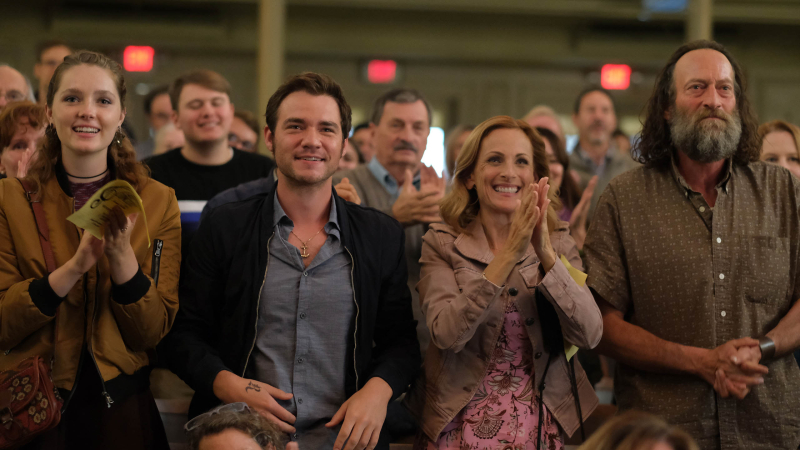
Amy Forsyth, Daniel Durant, Marlee Matlin, and Troy Kotsur in CODA
4 Feet High (dir. Rosario Perazolo Masjoan, Maria Belen Poncio)
On the other hand, my very favorite thing I saw during the entire festival is the rare work that centers someone with a disability and is co-written/directed by someone with a disability. This series is also the most queer-normative, sex-positive thing at Sundance and I just loved it so much! Read my full review.
Rita Moreno: Just a Girl Who Decided to Go For It (dir. Mariem Pérez Riera)
The rare PBS Masters doc that transcends its format. It begins with Norman Lear describing Rita Moreno as the American Dream and then spends the rest of its runtime breaking down why that is not the case. Yes, Moreno is an icon who has gifted us with so many wonderful performances. But the film shows all the ways racism and sexism kept her from even more. Moreno herself is such a burst of light and energy that the film doesn’t feel too heavy, but it does feel grounded and that results in the beautiful, complex portrait Rita Moreno deserves.
How It Ends (dir. Zoe Lister-Jones, Daryl Wein)
The writer/directors of this Covid-shot movie were like we’re bored in the pandemic let’s make a movie with our friends. And I think that’s lovely. Seems like they had a lot of fun! But FYI this is an ensemble movie set in contemporary LA where everyone is straight — and I mean straight. Like having conversations about anal as if it’s a wild sex act-level straight.
Rebel Hearts (dir. Pedro Kos)
This is a documentary about nuns!! Social justice nuns!! I didn’t know anything about the Sisters of the Immaculate Heart before this and I left delighted and inspired. “One of the best things that’s happening in the world is the fact that we’re realizing more deeply that awful things are happening in the world” is a quote that will stick with me for a long time. Also at least two of them are gay. That’s not stated in the documentary, but trust me at least two of them are gay — maybe all of them to be honest.
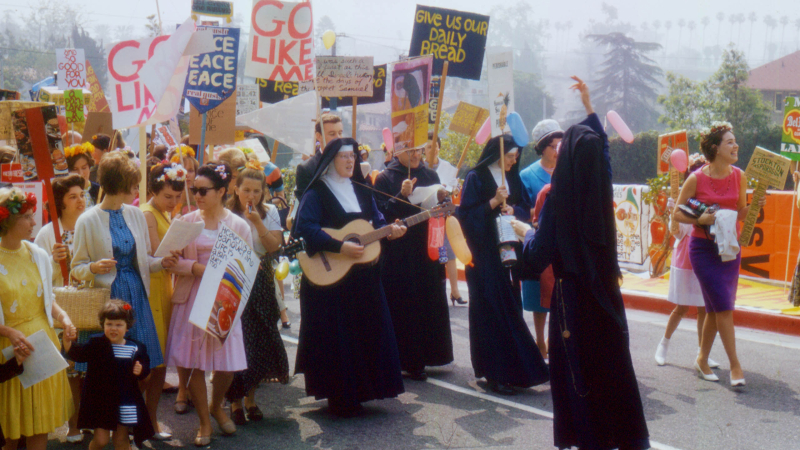
Still from Rebel Hearts
Knocking (dir. Frida Kempff)
An unsettling and grief-filled foray into one queer woman’s mind. This is a simple film, but it’s incredibly effective. Read my full review.
Barbed Wire Kisses Redux (panel)
This panel was a gay film nerd dream. Read my detailed recap.
Ma Belle, My Beauty (dir. Marion Hill)
It’s a delightful escape to spend time in this film’s French setting and chaotic polyamory. But I was frustrated with a subplot I found politically and emotionally muddled. Read my full review.
Searchers (dir. Pacho Velez)
The majority of this documentary about dating during the pandemic is just watching people swipe on dating apps. As expected, how interesting this is moment to moment largely depends on who’s swiping. There’s a queer woman named Lily swiping through Lex who sends the message: “Dating is a drag. Let’s catch an episode of Drag Race at a bar soon.” To which I said: It’s a pandemic!! But Lex just posted a picture of her with someone she’s been dating for a while so good for her. My favorite part focused on a trans woman who already has two partners and says she’s attracted to 50-75% of women. At one point she asks the director, “Are you heterosexual?” He says yes and she replies, “Oh good for you.” That was worth the whole thing.
Superior (dir. Erin Vassilopoulos)
Shot on 16mm, this 1980s-set mystery about two very different twin sisters is as formally confident as it is entertaining. This is exactly the kind of esoteric indie that’s fun to discover at a festival. Technically there’s nothing gay about it, but I did go on a few dates with the co-star/co-writer during my college boy years including showing her Before Sunrise and I don’t know that all feels pretty gay to me.
Passing (dir. Rebecca Hall)
Our one and only editor in chief Carmen Phillips has promised me she’s going to write a full review of this closer to its release. But what I’ll say for now is this adaptation of Nella Larsen’s novel doesn’t just keep the gay subtext — it emphasizes it. I guess that’s what happens when you cast Tessa Thompson and have Angela Robinson as an executive producer.
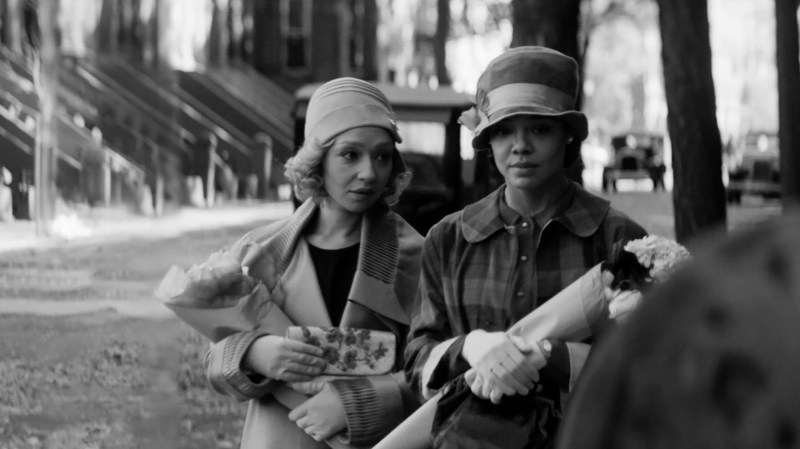
Ruth Negga and Tessa Thompson in Passing
Together Together (dir. Nikole Beckwith)
This a really sweet friend-com about chosen family and identity. Patti Harrison is truly remarkable. Read my full review.
My Name is Pauli Murray (dir. Julie Cohen, Betsy West)
Unfortunately, I agree with Carmen that this documentary is not at the level its subject deserved. But I still appreciated the opportunity to learn more about them. Read Carmen’s full review.
We’re All Going to the World’s Fair (dir. Jane Schoenbrun)
One of the best films and most unique experiences of the festival. I’m so thrilled that arguably the most inventive work this year is from a trans filmmaker. Trans cinema doesn’t just mean trans representation — it means a whole new way of seeing. Read my full review.
The Pink Cloud (dir. Iuli Gerbase)
This was another favorite of the festival for me! Written in 2017 and filmed in 2019, the marketing around this film about a mysterious pink cloud that forces the world to quarantine is really playing up the coincidence of its existence. But it’s more than just unsettling and relevant. It’s about the different ways people respond to hardship and how difficult that makes it to sustain relationships. I loved this movie so much and it’s not even a little gay so that’s saying something.
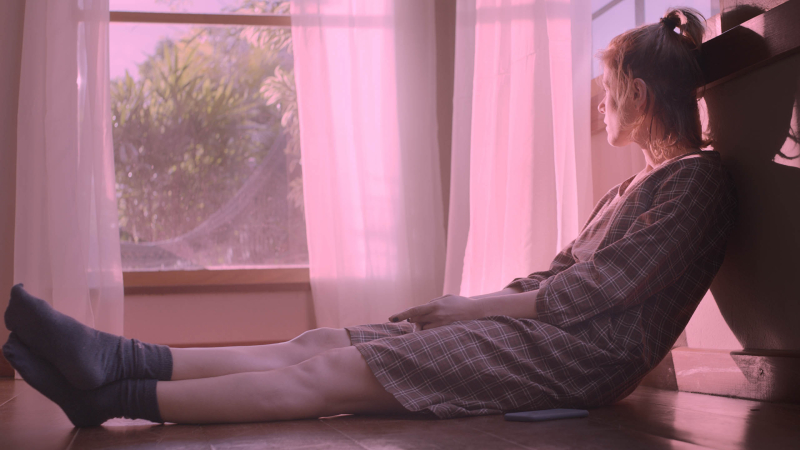
Renata de Lélis in The Pink Cloud
Wild Indian (dir. Lyle Mitchell Corbine Jr.)
Another favorite of the festival! I was really on a roll. This is a difficult film to watch due to both its literal and psychological violence. But Lyle Mitchell Corbine Jr.’s writing and direction and Michael Greyeyes’ performance make sure its sociopathic protagonist remains complex. Chaske Spencer also gives a standout supporting performance that adds a much needed light to this dark story. Before every screening Sundance had a land acknowledgement which is great, but it’s even better when that’s paired with celebrating Indigenous filmmakers this talented and Indigenous films this accomplished.
Cusp (dir. Isabel Bethencourt, Parker Hill)
The first of several documentaries that made me despair for American adolescence. This film follows three teenage girls living in Texas and shows the repeated abuse they suffer at the hands of men. It’s really good and isn’t graphic, but it just broke my heart hearing these girls recount their experiences. Gender is too complicated for me to be as misandrist as I used to be and yet this movie made it tempting!
El Planeta (dir. Amalia Ulman)
Amalia Ulman writes, directs, and stars in this movie with her real life mother about a mother and daughter determined to maintain a bourgeois lifestyle after Spain’s economic crash. This is a funny and charming movie with a political edge and has one scene that made me desperately miss in-person dates. FYI this movie is straight even though Ulman has short hair that all the men around her dislike.
Try Harder! (dir. Debbie Lum)
Next in the trilogy of doomed American adolescence, this portrait of the top ranked public high school in the country follows a group of kids desperate to get into the college of their dreams. Through the stories of several students, the film does an excellent job showing how race factors into the admissions process, and portraying how the whole system is toxic. Also if you are a person with mommy issues be warned that you might cry.
R#J (dir. Carey Williams)
OKAY. I was not expecting the social media adaptation of Romeo & Juliet to be one of my favorite movies of the festival and yet here we are! And I will not apologize! Everything about this movie where Romeo and Juliet first meet in Instagram DMs worked for me. I was delighted and moved and I loved this burst of weird creativity. The cast is great during the sillier moments and when actually performing Shakespeare’s text. I live on the internet and love Shakespeare and will always have a fondness for my horny teens Juliet and Romeo. Five stars. My new obsession. And, in case this needs to be mentioned, of course it’s gay because Romeo and Juliet are a canon U-Hauling Cancer for Cancer lesbian couple.
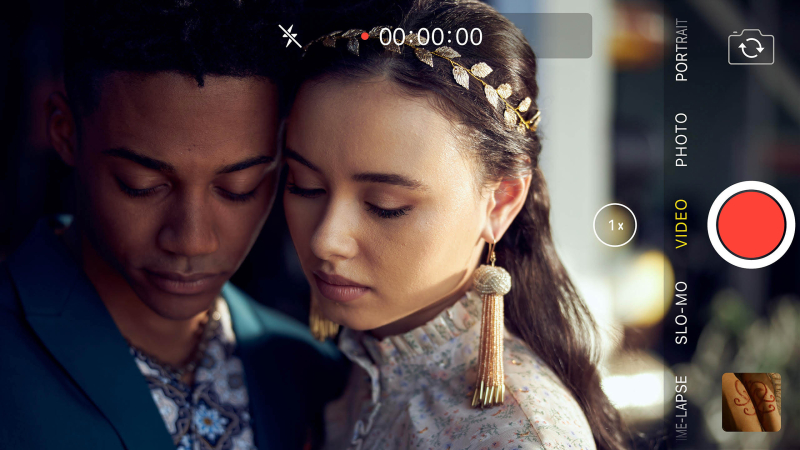
Camaron Engels and Francesca Noel in R#J
Ailey (dir. Jamila Wignot)
This is a more conventional PBS Masters doc, but what it lacks in ingenuity it makes up for in archival dance footage. Alvin Ailey remains a bit elusive as a figure, but his work is as powerful and present as ever. This made me hungry for a more experimental dance-focused tribute a la Pina (2011).
Mayday (dir. Karen Cinorre)
How is this movie about a woman in the 40s who is transported to a land of women soldiers who hunt men not even a little gay?? Okay it’s a little gay subtextually, because the girls can’t keep their hands off each other, but this was the rare case when calling for a film to be gayer isn’t me being facetious. I genuinely think this movie is hurt by its heterosexuality and with that its determination to be about how separatism is bad. Look, I agree separatism isn’t the answer, but the movie makes no compelling arguments. Mia Goth gives the most arresting performance as the lead separatist and I wanted to join her army and leave our boring protagonist behind.
The World to Come (dir. Mona Fastvold)
This is a gorgeously directed film that is, unfortunately, tainted by Casey Affleck’s involvement. It’s frustrating that the highest profile queer woman film at the festival is cis and white and produce by and co-starring an allegedly abusive man. Read my full review.
At the Ready (dir. Maisie Crow)
I had no idea that high schools along the border in Texas had criminal justice clubs. Not criminal justice reform clubs — criminal justice clubs. As in, former cops and border patrol training the students and filling their heads with propaganda. Director Maisie Crow approaches her subject without judgment and lets the horror reveal itself. It’s fascinating and heartbreaking to watch these students be manipulated and eventually become disillusioned — and terrifying to see which students remain unfazed. One of the film’s subjects, Mason, identifies as a lesbian at the start of the film, but is not out to his family. He says that the criminal justice club is his chosen family, because he knows his biological family will someday reject him. He struggles the most — his left-leaning, humanistic politics consistently clashing with the other students and the club itself. This is a tough film, but all of the students’ journeys are fascinating to watch, and it’s such a relief that the film ends with Mason in a new community and out as trans.
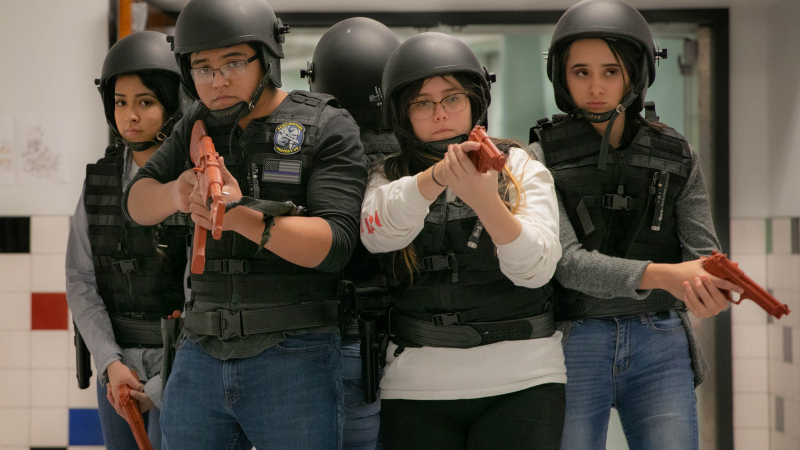
Still from At the Ready
The Blazing World (dir. Carlson Young)
This is an inventive, visually arresting fever dream of a debut from actor Carlson Young. It didn’t totally work for me, but I admired its creativity.
Would You Rather (series) (dir. Lise Akoka, Romane Gueret)
Inspired by conversations of its young leads, this French web series feels almost too authentic to teenagers. By that I mean GOD TEENAGERS ARE MEAN. This is a tough one to recommend because if there’s a category of offense this series covers it. But usually one of the other teens is quick to argue — this is a show about friends playing Would You Rather? so debates are frequent. For example, are our two main girls homophobic or are they secretly in love with each other? Truly who’s to say. I enjoyed this despite frequent cringing.
Pleasure (dir. Ninja Thyberg)
Ninja Thyberg’s first feature that takes a realistic look at the porn industry is the arrival of a new cinematic voice. The short version came out in 2013, but Thyberg decided if she was going to make this film she couldn’t do so as an outsider, instead befriending members of the industry and entering that world. The commitment pays off with a cast of primarily porn actors and an authenticity felt throughout. Despite its unique setting, this is a sort of classic rise to stardom story. It’s that familiarity and the depth of the characters’ relationships that make this more than a portrait of an industry — it’s a portrait of a person.
Unliveable (short) (dir. Enock Carvalho, Matheus Farias)
This Brazilian short about a cis mother looking for her missing trans daughter traffics in the usual trans trauma that cis directors love. But at least it takes a more mystical approach to its story and isn’t completely maudlin.
Trepanation (short) (dir. Nick Flaherty)
This experimental animated short is directed by a trans person and focuses on a character I presume to be queer even if the plot is too vague for that kind of labeling. A hole appears in this person’s floor and things just get weirder from there. I was really taken with the 3D animation and the moving abstract story.
This Is the Way We Rise (short) (dir. Ciara Lacy)
I really enjoyed this straight-forward portrait of queer native Hawaiian slam poet Jamaica Heolimeleikalani. The film shows how she is inspired after years of not writing by the efforts to protect sacred land on Mauna Kea.
Weirdo Night (pilot) (dir. Mariah Garnett, Jibz Cameron)
I ended the festival with this filmed pandemic performance of Dynasty Handbag’s queer cabaret show. Some of the performances are stronger than others, but after a week of watching movies in solitude it was nice to have a memory of being dragged to your friend’s show. This may be the first in a series of virtual shows and I’d certainly watch more. Especially if every episode had a performance as good as Together Together star Patti Harrison singing a song entitled “I’m Not Gay.”
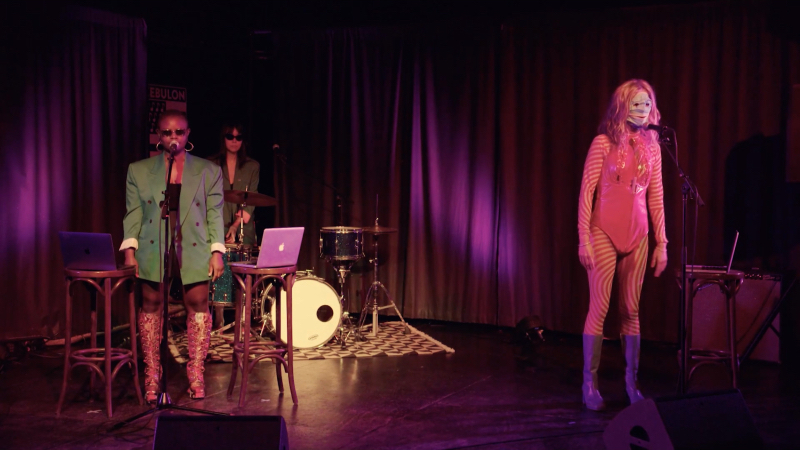
Patti Harrison, Vagabon, and Sasami in Weirdo Night
And that’s Sundance! I hope you got to see some exciting work or that you seek it out when it’s released. And I hope in 2022 I’m actually in Park City, because while, yes, I am gay enough to run into someone I briefly dated even at a virtual festival, there is something different about being gay in-person.


